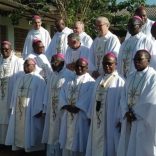Mozambique: "We give victims what they need"
Mozambique: Cabo Delgado, Nampula & Niassa Humanitarian Snapshot – March 2022

In March, insecurity continued to be reported across Cabo Delgado, particularly in the districts of Macomia, Ibo and Nangade, due to ongoing activities by non-state armed groups (NSAGs). According to IOM, fears of attacks and violence resulted in the displacement of 13,704 people, of whom 49 per cent were children, and 29 per cent were women. On 16 March, the Permanent Secretary of Mocímboa da Praia issued a call to all civil servants to return to their district headquarters. In March, a total of 316 people returned to their areas of origin in the districts of Mecula (41 people) in Niassa Province, while the remaining 375 people returned to the districts of Palma, Muidumbe, Macomia and Mocimboa da Praia, in Cabo Delgado Province.
In March, the overall humanitarian situation in northern Mozambique was further impacted by the effects of Tropical Cyclone Gombe, which made landfall in Nampula Province as Category 3 Cyclone a few weeks after the passage of Tropical Storms Ana and Tropical Depression Dumako. With torrential rains of up to 200mm/24h and violent winds of up to 185km/h, Cyclone Gombe toppled trees and ripped off roofs of buildings, destroyed houses, schools, and health centers, and washed away roads and crops. According to multisectoral assessments conducted by Mozambican authorities, more than 736,000 people were affected by the Cyclone, and 91,000 hectares of crops were lost.
The WFP seasonal monitor for Mozambique reported that the first part of the 2021/2022 season was marked by drought conditions in the northern provinces of Cabo Delgado, Nampula, and Niassa, which led to delays in the start of the season of up to one month. However, excessive rainfall in January led to a degree of recovery, starting planting, and early crop development. In March, the Famine Early Warning System Network (FEWSNET) reported that a near-average harvest is expected in the higher production areas of Mozambique, including in much of Niassa and the interior of Nampula and Cabo Delgado.
On 17 March, 2022, the Government increased fuel prices by up to 15 per cent due to rising crude oil prices on the international market. Gasoline, cooking oil, and diesel prices increased by 15 per cent, while paraffin prices increased by 5 per cent. The rise in fuel prices is likely to increase transportation costs and the cost of goods transactions and staple foods, thus reducing household purchasing power.













Leave a Reply
Be the First to Comment!
You must be logged in to post a comment.
You must be logged in to post a comment.